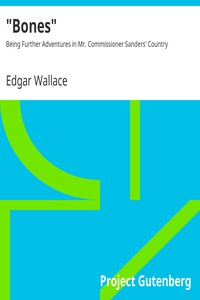The Keepers of the King's Peace by Edgar Wallace (mobi ebook reader TXT) 📕

Read free book «The Keepers of the King's Peace by Edgar Wallace (mobi ebook reader TXT) 📕» - read online or download for free at americanlibrarybooks.com
- Author: Edgar Wallace
Read book online «The Keepers of the King's Peace by Edgar Wallace (mobi ebook reader TXT) 📕». Author - Edgar Wallace
It is said that he could arrest the parrot in the air by a "cl'k!" and could bring the bird screeching and fluttering to his hand. He could call the shy little monkeys from the high branches where they hid, and even the fiercest of buffaloes would at his word come snuffling and nosing his brown arm.
So that, when he grew weak-minded, his relatives, after a long palaver, decided that for once the time-honoured customs of the land should be overridden, and since there was no other method of treating the blind but that prescribed by precedent, [Pg 156]he should be allowed to live in a great hut at the edge of the village with his birds and snakes and wild cats, and that the direction of village affairs should pass to his nephews.
Mr. Commissioner Sanders knew all this, but did nothing. His task was to govern the territory, which meant to so direct affairs that the territory governed itself. When the fate of K'sungasa was in the balance, he sent word to the chief's nephews that he was somewhere in the neighbourhood, and that the revival of the bad old custom of blinding would be followed by the introduction of the bad new custom of hanging; but this had less effect upon the council of relatives—to whom Sanders's message was not transmitted—than the strange friendship which K'sungasa had for the forest folk.
The nephews might have governed the village, exacted tribute, apportioned fishing rights, and administered justice for all time, but for the fact that there came a period of famine, when crops were bad and fish was scarce, and when, remarkably enough, the village of L'bini, distant no more than a few hours' paddling, had by a curious coincident raised record crops, and had, moreover, a glut of fish in their waters.
There was the inevitable palaver and the inevitable solution. O'ka and B'suru led ten canoes to the offending village, slaughtered a few men and burnt a few huts. For two hours the combatants pranced and yelled and thrust at one [Pg 157]another amidst a pandemonium of screaming women, and then Lieutenant Tibbetts dropped from the clouds with a most substantial platoon of Houssas, and there was a general sorting out.
Sanders held a court on one of the middle islands near the Residency, and B'suru was sent to the Village of Irons for the term of his natural life. O'ka, who had fled to the bush, escaped, however, and with him a headman and a few followers.
Lieutenant Tibbetts, who had spent two profitable days in the village of Jumburu, came back to the Residency a very thoughtful young man.
"What is the matter with Bones?" asked Captain Hamilton.
His sister smiled over her book, but offered no other comment.
"Do you know, Pat?" demanded Hamilton sternly.
Sanders looked at the girl with a twinkle in his grey eyes, and lit a cheroot. The relationships between Patricia Hamilton and Bones were a source of constant joy to him. Taciturn and a thought dour as he was, Pat would never have suspected the bubbling laughter which arose behind that lean brown face, unmovable and, in his moments of most intense enjoyment, expressionless.
"Bones and I have a feud," said the girl.
Sanders smiled.
[Pg 158]"Not as violent a feud as O'ka and I have, I hope?" he said.
She frowned a little and looked at him anxiously.
"But you don't worry about the threats of the people you have punished?" she asked.
"I haven't punished O'ka," said Sanders, "and an expedition into the bush would be too expensive an affair. He has apparently settled with the B'wigini people. If they take up his feud, they might give trouble. But what is your trouble with Bones?"
"You must ask him," she said.
Hamilton's opportunity came next day, when Bones applied for leave.
"Leave?" said Captain Hamilton incredulously. "Leave, Bones? What the dickens do you want leave for?"
Bones, standing as stiff as a ramrod before the office table at which his superior sat, saluted.
"Urgent private affairs, sir," he said gruffly.
"But you haven't any private affairs," protested Hamilton. "Your life is an open book—you were bragging about that fact yesterday."
"Sir and brother-officer," said Bones firmly, "a crisis has arisen in my young life. My word, sir, has been called into doubt by your jolly old sister. I desire to vindicate my honour, my reputation, an' my veracity."
"Pat has been pulling your leg!" suggested Hamilton, but Bones shook his head.
"Nothin' so indelicate, sir. Your revered an' [Pg 159]lovely relative—God bless her jolly old heart!—expressed her doubt in re leopards an' buffaloes. I'm goin' out, sir, into the wilds—amidst dangers, Ham, old feller, that only seasoned veterans like you an' me can imagine—to bring proof that I am not only a sportsman, but a gentleman."
The timely arrival of Miss Patricia Hamilton, very beautiful in dazzling white, with her solar helmet perched at an angle, smote Bones to silence.
"What have you been saying to Bones?" asked Hamilton severely.
"She said——"
"I said——"
They began and finished together.
"Bones, you're a tell-tale," accused the girl.
"Go on," said Bones recklessly. "Don't spare me. I'm a liar an' a thief an' a murderer—don't mind me!"
"I simply said that I didn't believe he shot the leopard—the one whose skin is in his hut."
"Oh, no," said Bones, with heavy sarcasm, "I didn't shoot it—oh, no! I froze it to death—I poisoned it!"
"But did you shoot it?" she asked.
"Did I shoot it, dear old Ham?" asked Bones, with great calmness.
"Did you?" asked Hamilton innocently.
"Did I shoot at that leopard," Bones went on deliberately, "an' was he found next mornin' [Pg 160]cold an' dead, with a smile on his naughty old face?"
Hamilton nodded, and Bones faced the girl expectantly.
"Apologize, child," he said.
"I shall do nothing of the kind," she replied, with some heat. "Did Bones shoot the leopard?"
She appealed to her brother.
Hamilton looked from one to the other.
"When the leopard was found——" he began.
"Listen to this, dear old sister," murmured Bones.
"When the leopard was found, with a spear in its side——"
"Evidently done after death by a wanderin' cad of a native," interposed Bones hastily.
"Be quiet, Bones," commanded the girl, and Bones shrugged his shoulders and obeyed.
"When the leopard was found," continued Hamilton, "he was certainly beyond human aid, and though no bullet mark was discovered, Bones conclusively proved——"
"One moment, dear old officer," interrupted Bones. He had seen out of the tail of his eye a majestic figure crossing the square.
"Will you allow me to produce scientific an' expert evidence?"
Hamilton assented gravely, and Bones went to the door of the orderly room and roared a name.
"I shall produce," he said quietly, but firmly, [Pg 161]"the evidence of one who enjoyed the confidence of dear old Professor What's-his-name, the eminent thigumy-ologist. Oh, Ali!"
Ali Abid, a solemn figure, salaamed in the doorway.
Not for nothing had he been factotum to a great bacteriologist before the demise of his master had driven him to service with a lieutenant of Houssas. His vocabulary smelt of the laboratory, his English was pure, undefiled, and unusual.
"Ali, you remember my leopard?"
"Sir," said Ali, shaking his head, "who can forget?"
"Did I kill him, Ali?" asked Bones. "Tell the lady everything."
Ali bowed to the girl.
"Miss or madame," he said, "the leopard (Felis pardus), a wild beast of the Felidæ family, is indigenous to forest territory. The subject in question—to wit, the skin thereof exhibited by Sir Bones—was particularly ferocious, and departed this life as a result of hunting conducted by aforesaid. Examination of subject after demise under most scientific scrutiny revealed that said leopard (Felis pardus) suffered from weak heart, and primary cause of death was diagnosed as shock occasioned by large 'bang' from Sir Bones's rifle."
"What did I say?" asked Bones complacently.
"Do you mean to tell me," gasped the girl, "that you frightened the leopard to death?"
[Pg 162]Bones spread out his hands disparagingly.
"You have heard the evidence, dear old sister," he said; "there is nothing to add."
She threw back her head and laughed until her grey eyes were swimming in tears.
"Oh, Bones, you humbug!" she laughed.
Bones drew himself up more stiffly than ever, stuck his monocle in his eye, and turned to his chief.
"Do I understand, sir," he said, "that my leave is granted?"
"Seven days," said Hamilton, and Bones swung round on his heel, knocked over Hamilton's stationery rack, stumbled over a chair, and strode gloomily from the hut.
When Patricia Hamilton woke the next morning, she found a note pinned to her pillow.
We may gloss over the impropriety of the proceedings which led to this phenomenon. Bones was an artist, and so small a matter as the proprieties did not come into his calculations.
Patricia sat up in bed and read the letter.
"Dear Old Friend and Doutting Thos."
(Bones's spelling was always perfectly disgraceful),—
"When this reaches you, when this reaches you, I shall be far, far away on my long and dangerus journey. I may not come back, I may not come back, for I and a faithful servant are about to penetrate to the lares of the wild [Pg 163]beasts of the forest, of the forest. I am determined to wipe out the reproach which you have made. I will bring back, not a dead leppard, not a dead leppard, but a live one, which I shall seeze with my own hands. I may lose my life in this rash and hazardus enterprise, but at least I shall vindycate my honour.—Farewell, dear old Patrisia.
"Your friend,
"B."
"Which proves," said Hamilton, when he was shown the letter, "that Bones is learning to spell. It only seems yesterday when he was spelling 'Hamilton' with three m's. By the way, how did you get this letter?"
"I found it pinned to the door," said Patricia tactfully.
Bones went by the shortest route to Jumburu, and was received without enthusiasm, for he had left a new chief to rule over a people who were near enough to the B'wigini to resent overmuch discipline. But his business was with K'sungasa, for the two days' stay which Bones had made in the village, and all that he had learnt of the old tamer, had been responsible for his reckless promise to Patricia Hamilton.
He came at a critical moment, for K'sungasa, a thin and knobbly old man, with dim eyes and an incessant chuckle, was very near his end. [Pg 164]He lay on a fine raised bed, a big yellow-eyed wild cat at his feet, a monkey or two shivering by the bedside, and a sprawling litter of kittens—to which the wild cat leapt in a tremble of rage when Bones entered the hut—crawling in the sunlight which flooded the hut.
"Lord Tibbetti," croaked the old man, "I see you! This is a good time, for to-morrow I should be dead."
"K'sungasa," said Bones, seating himself gingerly, and looking about for the snake which was usually coiled round the old man's stool, "that is foolish talk, for you will see many floods."
"That is fine talk for the river folk," grinned the old man, "but not for we people of the forest, who never see flood and only little-little rivers. Now, I tell you, lord, that I am glad to die, because I have been full of mad thoughts for a long time, but now my mind is clear. Tell me, master, why you come."
Bones explained his errand, and the old man's eyes brightened.
"Lord, if I could go with you to the forest, I would bring to you many beautiful leopards by my magic. Now, because I love Sandi, I will do this for you, so that you shall know how wise and cunning I am."
In the woods about the village was a wild plant, the seeds of which, when pounded and boiled in an earthen vessel, produced, by a rough method of distillation, a most pungent liquid. Abid [Pg 165]spoke learnedly of pimpinella anisum, and probably he was right.[4]
Bones and his assistant made many excursions into the woods before they found and brought back the right plant. Fortunately it was seed-time, and once he was on the right track Bones had no difficulty in securing more than a sufficient quantity for his purpose.
He made his distillation under the old man's directions, the fire burning in the middle of the hut. As the drops began to fall from the narrow neck of his retort, a fault sweet aroma filled the hut. First the cat, then the monkeys began to show signs of extraordinary agitation. Cat and kittens crouched as near the fire as they could, their heads craned towards the brown vessel, mewing and whimpering. Then the monkeys came, bright-eyed and eager.
The scent brought the most unexpected beasts from every





Comments (0)